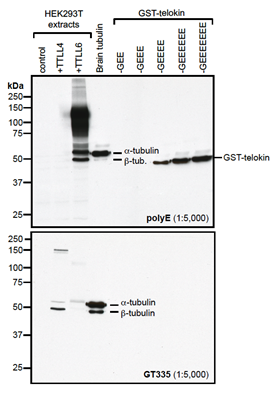Adipogen
anti-Polyglutamate chain (polyE), pAb (IN105)
anti-Polyglutamate chain (polyE), pAb (IN105)
Microtubules are key elements of the eukaryotic cytoskeleton that dynamically assemble from heterodimers of ?- and ?-tubulin. Two different mechanisms can generate microtubule diversity: the expression of different ?- and ?-tubulin genes, referred to as tubulin isotypes, and the generation of posttranslational modifications (PTMs) on ?- and ?-tubulin. Tubulin PTMs include the well-known acetylation or phosphorylation, and others that have so far mostly been found on tubulin, detyrosination/tyrosination, polyglutamylation and polyglycylation. These PTMs might have evolved to specifically regulate tubulin and microtubule functions. Polyglutamylation is a PTM that occurs when secondary glutamate side chains are formed on ?-carboxyl groups of glutamate residues in a protein. Enzymes catalyzing polyglutamylation belong to the TTL-like (TTLL; Tubulin tyrosine ligase-like) family of glutamylases. Deglutamylases, the enzymes that reverse polyglutamylation, were identified within a novel family of CCPs (cytosolic carboxypeptidase). Subtle differences in polyglutamylation can be seen on diverse microtubules in different cell types. The functions of these modifications remain to be studied. However, its wide distribution strengthens the idea that it could be involved in fine-tuning a range of microtubule functions. PolyE labels centrioles as they mature, such that two foci are present throughout the cell cycle.
Couldn't load pickup availability
General Specifications
1. Source/Host: Rabbit2. Immunogen/Antigen: Polyglutamate peptide.
3. Specificity: Recognizes C-terminally located linear alpha-glutamate chains of 4 and more glutamate residues.
4. Purity Detail: Epitope-affinity purified.
5. Concentration: Lot dependent
6. Formulation: Liquid. In PBS containing 0.02% sodium azide.
7. Shipping: BLUE ICE
8. Short Term Storage: +4°C
9. Long Term Storage: +4°C
Safety & Documentation
View full details
Disclaimer: Products are chemical reagents for research use
only and are not intended for human use. We do not sell to patients.

